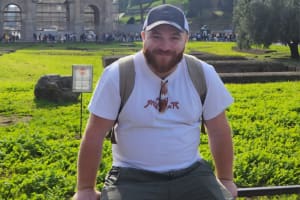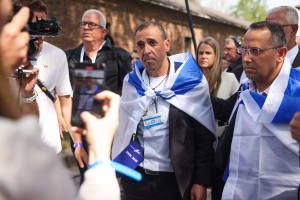Are there signs of optimism and hope amidst war? Israeli spokesperson Tal Heinrich points to a growing alliance with Evangelicals as one of them
Joel and Lynn Rosenberg host Heinrich on ‘Inside the Epicenter’ podcast to discuss Israel’s ongoing security, diplomatic challenges

Israel has been facing a multi-front war for 11 months now. While nothing can erase the horrors of Oct. 7 and the ongoing sorrow of many families, there are signs of optimism and hope across the nation.
“All over you see soldiers proposing engagements, weddings, people are expanding their families… I'm hearing so many stories of Israelis all across the country,” Israeli spokesperson Tal Heinrich told ALL ISRAEL NEWS Editor-in-Chief Joel Rosenberg.
On Oct. 7, Heinrich was at her home in New York when she received a call from the Israeli Prime Minister’s Office. She got called up to serve as a spokesperson for Israel during the war and took the first available flight to her homeland.
Heinrich is an Israeli journalist and news anchor based in New York. She writes for ALL ISRAEL NEWS and produces for THE ROSENBERG REPORT on TBN. Prior to her work with Rosenberg, she hosted a daily program for the English-language Israeli news service, i24NEWS.
Rosenberg and his wife Lynn, co-founders of The Joshua Fund, recently hosted Heinrich on their podcast ‘Inside the Epicenter.’ As a newlywed, she described to them how her personal story throughout the war reflects a “national trend” of Israelis putting more focus on their families.
Many IDF soldiers, hostages who returned home, as well as Oct.7 survivors, have expressed their desire to get married and either start or expand their families. Many Israelis are also placing a renewed focus on their faith, vowing to take it upon themselves to do more “mitzvahs” – meaning to follow commandments from God or perform good deeds, such as charitable acts.
“It's a story of resilience. And as you know, the Jewish people have demonstrated resilience all throughout history,” Heinrich told Rosenberg. “A war, especially of this kind, really redefines your life priorities.”
“I have a good example for you,” she continued. “Over the weekend I met a young woman here in New York. She just moved from Israel with her husband, who is doing his MBA in one of the universities here. She was a web developer in Israel, but now she told me, ‘I'm here for one year and I don’t feel like I want to spend this year coding… maybe I can do something meaningful for my people, for my country, working with one of the pro-Israel organizations or join the Consulate here in the city. What can I do to help?’”
In that same context, Rosenberg noted that the past year has also been a record year for aliyah (immigration to Israel).
“I think so far 29,000 people, Jewish people, have moved to Israel to become new citizens in a year that most people would think, why would you go become part of a country that's being attacked from seven different directions?” he said.
“How do you see the Evangelical Community as a Jewish person who doesn't agree with us theologically, but you've obviously chosen to build an alliance with us personally?” Rosenberg asked Heinrich.
“Oct. 7 and the war have shown us two things,” she replied. “First, and I've said it multiple times throughout the war in interviews, that we're not going to take any chances on our security. Israel will do what it has to do, regardless of outside pressure. Of course, we're going to take our own faith and in our own hands, because there's no compromise on the security of Israelis. We've done that for far too long, too many years.”
“At the same time, you need alliances… And it's always better when there's no daylight between you and your allies in terms of deterrence against the enemies. Now, we usually speak about alliances in terms of, you know, with other countries. But it's not only about countries. There are different types of alliances between people. Religion can define them, shared values can define them,” she continued.
Heinrich stressed that Israel’s alliance with Evangelicals emboldens the cause of the Jewish state and strengthens its security, just like a strong alliance between nations.
“I'm not saying that Evangelicals can vote at the United Nations Security Council as a bloc. I wish it was the case, right?” she joked.
“I'm encouraged overall,” said Rosenberg. “I do see many Israelis are telling me personally… that there is a growing realization that Israel is more alone than we thought we were, that some allies, either countries or political leaders or communities aren't standing with us the way we thought they would. And in some cases, have turned against us. And yet, Evangelicals are proving to be the friends that we say that we want to be, which is unconditional love.”
“Has Israel made mistakes during this war? Of course… You can't wage war and not make mistakes. But Evangelicals have not been quick to assume bad intent on the hearts of Israeli leaders or Israeli commanders or Israeli forces. I think there’s a steady growing closer between the Jewish community, certainly Israelis and Evangelicals,” Rosenberg concluded.

The All Israel News Staff is a team of journalists in Israel.
You might also like to read this:















